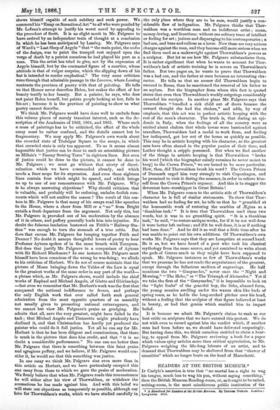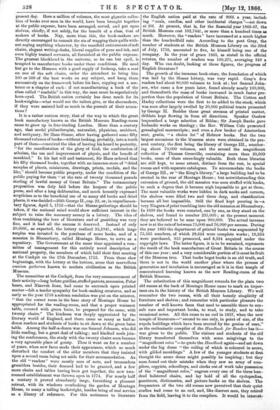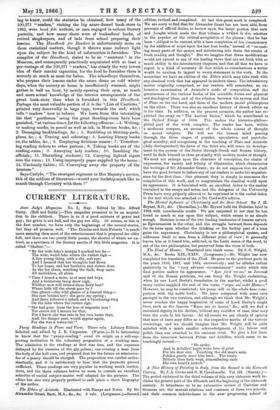READERS AT THE BRITISH MUSEUM.* Jr Carlyle's assertion is true
that "no mortal has a right to wag his tongue, much less to wag his pen, without saying something," then the British Museum Reading-room, or, as it ought to be called, writing-room, is the most mischievous public institution of the
4' 4 Handbook for iteaders at R40 britia Museum. DI Um.; Mahal& 'Amapa ; Longman& lthin.
present day. Here a million of volumes, the most gigantic collec- tion of books ever seen in the world, have been brought together at the public expense, have been arranged, sorted, and put upon shelves, chiefly, if not solely, for the benefit of a class, that of makers of books. Nay, more than this, the book-makers are directly encouraged to commit the sin of wagging their quills with- out saying anything whatever, by the manifold enticements of soft chairs, elegant writing-desks, liberal supplies of pens and ink, and even highly trained servants, all furnished at the public expense. The greatest blockhead in the universe, so he can but spell, is tempted to manufacture books under these conditions. He need but go to the Museum with a good supply of foolscap, take a seat on one of the soft chairs, order the attendant to bring him 100 or 500 of the best works on any subject, and hang them successively on the framework before his face, copying out a sen- tence or a chapter of each : if not manufacturing a book of the class called "readable" in this way, the man must be superlatively horn-eyed. The British nation certainly has done much for its bookwrighta—what would not the tailors give, or the shoemakers, if they were assisted half as much in the pursuit of their avoca- tions?
It is a rather curious story, that of the way in which the great book manufactory known as the British Museum Reading-room came to grow up in free-trading London. More than a century ago, that model philanthropist, naturalist, physician, architect, and antiquary, Sir Hans Sloane, after having gathered some fifty thousand volumes of books—without looking, probably, into a tenth part of them—conceived the idea of leaving his hoard to posterity, "for the manifestation of the glory of God, the confutation of atheism, the use and improvement of physic, and the benefit of mankind." In his last will and testament, Sir Hans ordered that his fifty thousand books, together with an immense store of "dried samples of plants, miniatures, drawings, prints, medals, and the like," should become public property, under the condition of the public paying for them "at the rate of twenty thousand pounds sterling of lawful money of Great Britain." The testamentary proposition was duly laid before the keepers of the public purse, and after a long deliberation, and much honestly expressed scepticism as to the beneficial use of so many old books and dried plants, it was decided-26th George II., cap. 22, or, in unparliamen- tary figures, April 5, 1753—that the Sloane gatherings should be taken, if the national mind would show sufficient interest in the subject to raise the necessary money in a lottery. The idea of thus combining the love of literature and of gambling was very fine, and it had all the success it deserved.. Instead of only 20,000/., as expected, the lottery realized 95,194/., which large surplus was invested in the purchase of more books, and of a mansion in Bloomsbury, called Montagu House, to serve as a repository. The Government at the same time appointed a com- mittee of management for this entirely novel description of national property, the members of which held their first meeting at the Cockpit on the 17th December, 1753. From these slow beginnings, with the lottery at the bottom, arose that marvellous omnium gatherum known to modern civilization as the British Museum.
The committee at the Cockpit, from the very commencement of their activity—long before gorillas, stuffed parrots, mummies, Polar bears, and Nineveh lions, had come to encroach upon printed matter —felt a tender sympathy for book-making creatures, and as early as the year 1758 a solemn resolution was put on the minutes, "that the corner room in the base story of Montagu House be appropriated for the reading-room, and that a proper wainscot table, covered with green baize, be prepared for the same, with twenty chairs." The kindness was deeply appreciated by the literary world of England, and there came as many as half-a- dozen readers and students of books to sit down at the green baize table. Among the half-a-dozen was one Samuel Johnson, who did little reading, but a great deal of talking; and kindred souls join- ing the conferences, the study with the twenty chairs soon became a very agreeable place of gossip. Thus it went on for a number of years, when new faces made their appearance, which so much disturbed the comfort of the older members that they insisted upon a second room being set aside for their accommodation. As the old " readers " were mostly men of note, and tremendous grumblers besides, their demand had to be granted, and a few more chairs and tables having been got together, the new two- roomed establishment was thrown open in 1774. For nearly half a century it proved abundantly large, furnishing a pleasant retreat, with its windows overlooking the garden of Montagu House, to many a toiling bookwright, besides being of real service as a library of reference. For this assistance to literature the English nation paid at the rate of 9001. a year, includ- ing "coals, candles, and other incidental charges "—set down at 20/. At present, that is, for the financial year 1866-67, the British Museum cost 102,7441., or more than a hundred times as much. However, the "readers" have increased at a much higher than the hundredfold rate. According to the poet Gray, the number of students at the British Museum Library on the 23rd of July, 1759, amounted to five, he himself being one of the company. In the year of grace 1865, as stated in the official returns, the number of readers was 100,271, averaging 349 a day. Who can doubt, looking at these figures, the progress of English literature ?
The growth of the immense book-store, the foundation of which was laid by the Sloane lottery, was very rapid. Gray's five readers had about 80,000 volumes to look at ; but Samuel John- son, who came a few years later, found already nearly 100,000, and thenceforth the mass of books increased in much faster pro- portion than the population of Great Britain. The Cotton and Harley collections were the first to be added to the stock, which was soon after largely swelled by 30,000 political tracts presented by George II. Besides these great streams of printed matter, driblets kept flowing in from all directions. Speaker Onslow bequeathed a large selection of Bibles ; Sir Joseph Banks gave Icelandic works on theology ; the Rev. William Cole presented genealogical manuscripts ; and even a Jew broker of Amsterdam sent, gratis, "a choice lot" of Hebrew books. But the two largest accessions to the Museum store were obtained in the pre- sent century, the first being the library of George III., number- ing about 70,000 volumes, and the second the magnificent collection of Thomas Grenville, containing more than 20,000 books, some of them exceedingly valuable. Both these libraries are still kept, to some extent, distinct from the rest, in special rooms and with separate catalogues. To accommodate the books of George Ill., or "the King's library," a large building had to be erected in the rear of Montagu House ; but notwithstanding this extension of ground, the old mansion was soon stuffed with books, to such a degree that it became nigh impossible to get at them. The most valuable works were hidden in dark nooks and corners, the shelves were filled two and three deep, and classification became all but impossible. Still the flood kept pouring in—a very Niagara of print tumbling into the old mansion at Bloomsbury. In 1838 the books were counted, one by one, as they stood on the shelves, and found to number 235,000; at the present moment they are believed to be near upon 900,000. The actual increase now is at the rateof between 75,000 and 76,000 per annum. During the year 1865 the department of printed books was augmented by 75,565 numbers, of which 28,644 were complete works ; 19,336 were purchased, 915 presented, and 8,394 acquired under the copyright laws. The latter figure, it is to be surmised, represents the result of the book manufacture of Great Britain in the course of this one year ; and a very considerable portion of it must be fruil. of the Museum tree. That books beget books is an old truth, and. there is not in the world another place where the process of generation and incubation is tncouraged as it is in that temple of concentrated learning known as the new Reading-room of the British Museum.
The substitution of this magnificent rotunda for the plain two old rooms at the back of Montagu House came to mark an impor- tant era in the history of the British Museum Library. We well remember the two rooms, with all their homely simplicity of furniture and shelves ; and remember with particular pleasure the number of well known faces that used to assemble there to con- sult rare and important books, to read, to study, and to take occasional notes. All this came to an end in 1857, when the new temple of literature—" second to one only, in point of size, of the cupola buildings which have been erected by the genius of man," as the enthusiastic compiler of the Handbook for Readers has it— was given to the public. The visitors and students of the old library transferred themselves with some misgivings to the "magnificent salon "—to quote the Handbook again—and sat down under the big dome "the ceiling of which is coloured in azure, with gilded mouldings." A few of the younger students at first thought the azure dome might possibly be inspiring ; but they soon found out their mistake when they saw an army of com- pilers, copyista, schoolboys, and clerks out of work take possession of the "magnificent salon," engross every one of the three hun- dred bolstered chairs, and lay hold of all the cyclopaadias, gazetteers, dictionaries, and picture-books on the shelves. The frequenters of the two old rooms now perceived that their quiet studies had come to an end, and, like discreet men, they retired from the field, leaving it to the compilers. It would be interest- lug to know, could the statistics be obtained, how many of the 100,271 "readers," visiting the big azure-domed book-store in 1865, were bond fide authors, or men engaged in serious literary pursuits, and how many there were of booksellers' hacks, of retired shopkeepers, and of lads from school preparing their lessons. The Handbook for Readers is unfortunately mute on these statistical matters, though it throws some indirect light upon the subject by the kind of information it furnishes. The compiler of the Handbook, stated to be an " assistant " in the Museum, and consequently practically acquainted with at least a per-centage of the 100,271 "readers," has clearly the very lowest idea of their mental capacities, for the food he furnishes them is scarcely so much as meat for babes. The schoolboys themselves, who prepare their lessons under the azure dome on cold wintry days, when the nursery at home is insufficiently warmed, might gather in half an hour, by merely opening their eyes, as much and more actual knowledge of the interior arrangements of the great book-store than what is furnished in this Handbook. Perhaps the most valuable portion of it is the "List of Cautions," printed very deservedly in large type, towards the end, which tells "readers "how to behave. We learn from this interesting list that 'gentlemen' using the great Reading-room have been punished, "at various times, for the following offences: —1. Writing, or making marks, in pencil as well as ink, in Museum books, &c. ; 2. Damaging bookbindings, &c. ; 3. Scribbling on blotting-pads, plans, &c. ; 4. Tracing and colouring; 5. Leaving library books on the tables, &c. ; 6. Employing fictitious names ; 7. Transferr- ing reading tickets to other persons ; 8. Taking books out of the reading-room ; 9. Annoying lady readers ; 10. Insulting the officials ; 11. Disturbing students ; 12. Carrying lighted cigars into the room ; 13. Using improperly paper supplied by the house ; 14. Uncleanly habits ; 15. Conveying away the property of the trustees."
Says Carlyle, "The strangest regiment in Her Majesty's service, this of the soldiers of literature—would your lordship much like to march through Coventry with them ?"
































 Previous page
Previous page